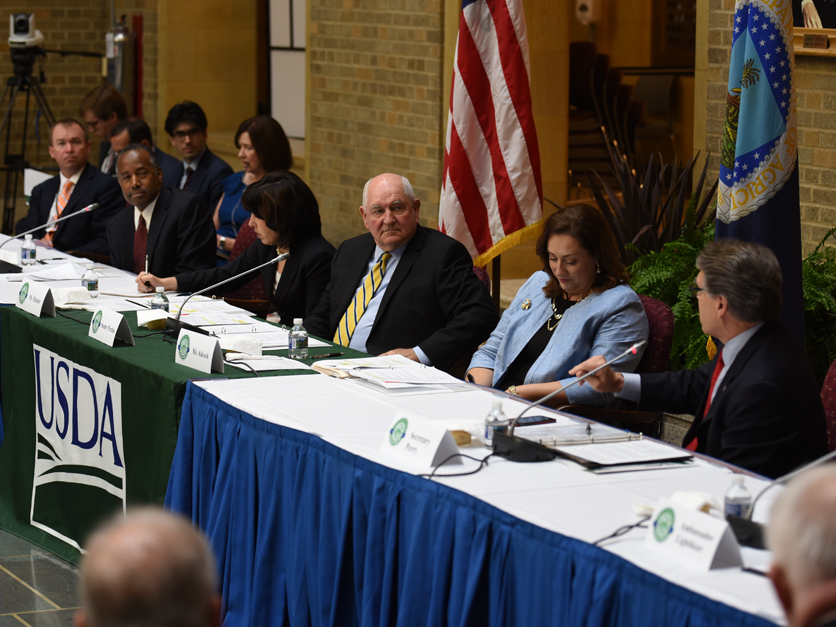WASHINGTON, June 15, 2017 – Members of President Trump’s Cabinet and senior officials from the White House and throughout the federal government today pledged to forge agreement on ways to boost the farm economy and address economic and social challenges across rural America.
Agriculture Secretary Sonny Perdue, hosting the first meeting of the cross-government Task Force on Agriculture and Rural Prosperity, promised that the interagency effort would produce a “serious plan” for changing policies, regulations and laws that inhibit economic growth.
“If you know anything about our president, it was not an executive suggestion” to produce the plan, “it was an executive order,” Perdue said, flanked by Energy Secretary Rick Perry, U.S. Trade Representative Robert Lighthizer, Housing Secretary Ben Carson and Budget Director Mick Mulvaney, among others.
“The president has moved swiftly … to make sure that he lets everyone know that agriculture is important and rural prosperity is important,” Perdue said.
The task force’s assignment will be carried out by working groups focusing on four issue areas: quality of life; rural workforce needs; innovation, technology and data; and economic development, Perdue said.
The plan that the working groups will produce will include ways to measure whether the recommendations are successful in producing improvements, Perdue told reporters after the meeting. He did not say when the final report is due.
During the meeting, which lasted more than an hour, the Cabinet officials and agency representatives made no mention of Trump’s fiscal 2018 budget, which proposed to slash USDA Rural Development programs, including water infrastructure and housing assistance.
But Mulvaney, who oversaw development of the budget, sought to emphasize that rural America needs special attention in such areas as housing, energy and telecommunications. ‘The president understands that rural America is just different, and if you’re not there, like I am, just go,” Mulvaney said.
He added, “If you’re going to address the need of rural America, you can’t do it one agency at a time.”
Other officials outlined their priorities or highlighted programs their departments or agencies are responsible for that are important to rural America.
Lighthizer said that removing barriers to biotech products would be a major focus of USTR. The inability to sell genetically engineered commodities overseas can slow the commercialization of those products domestically, he said. “We’re going to bring cases at the WTO and other venues and insist that any barriers be science based,” Lighthizer said.
The chairman of the Federal Communications Commission, Ajit Pai, gave one of the most impassioned presentations, emphasizing the need for rural broadband and cellular service to improve farm productivity and to reverse the “brain drain” in rural communities by making them more attractive places to live.
“This is an issue that’s not just a professional obligation for me, it’s a personal passion,” said Pai, who grew up in rural Kansas.
He recounted a recent tour of small towns in Minnesota, Wisconsin, Iowa and South Dakota. Such communities “are off the beaten path, but they are critical to the fabric of American life,” he said. He also described seeing a GPS-controlled combine in Maryland.
Other infrastructure issues also received mention. Transportation Secretary Elaine Chao’s chief of staff, Geoff Burr, who represented her at the meeting, said Chao understood that private investment would be difficult to find for roads and other projects. “Tolling won’t work,” he said. But he said that there were different approaches to public-private partnerships that could.
Agricultural labor needs received relatively short shrift. Labor Secretary Alex Acosta’s chief of staff, Wayne Palmer, didn’t mention the H-2A visa program, which farm groups say is too restrictive. Instead, he focused on the struggle among some manufacturers to find workers with the skills that those companies need in rural as well as urban areas.
Energy Secretary Rick Perry was among several officials who emphasized the importance of addressing rural concerns about federal regulations. “One of the places that you can affect people either positively or negatively is on the regulatory side,” he said.
Tate Bennett, a representative of the Environmental Protection Agency, noted that rewriting the “Waters of the United States” rule that defines the jurisdiction of the Clean Water Act is a top priority for Administrator Scott Pruitt. “He wants to hear from the people who are directly impacted by WOTUS, and that’s rural America,” she said.
#30


